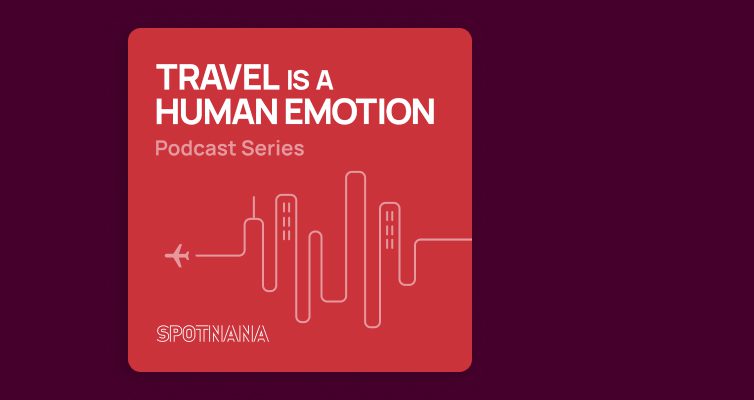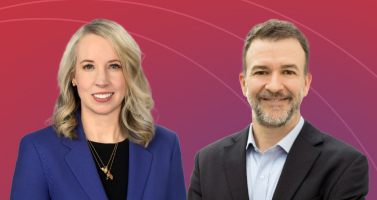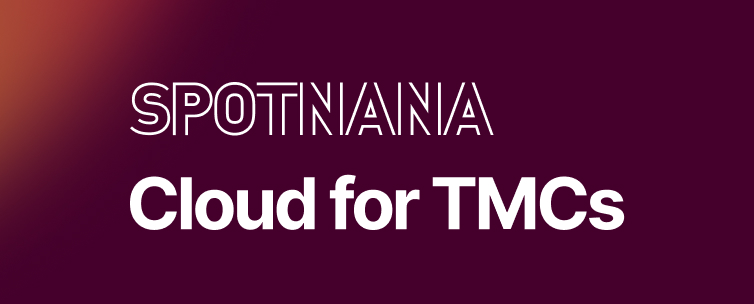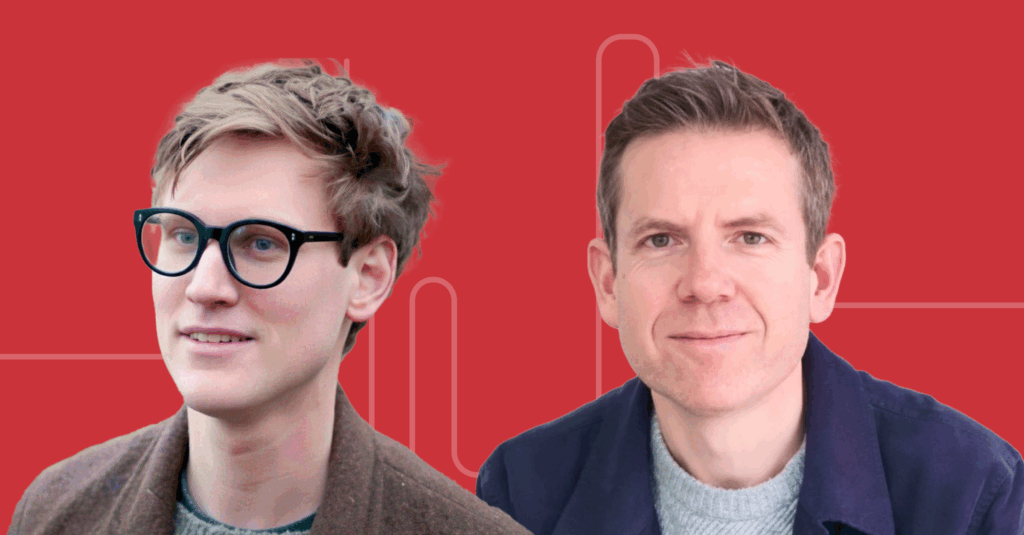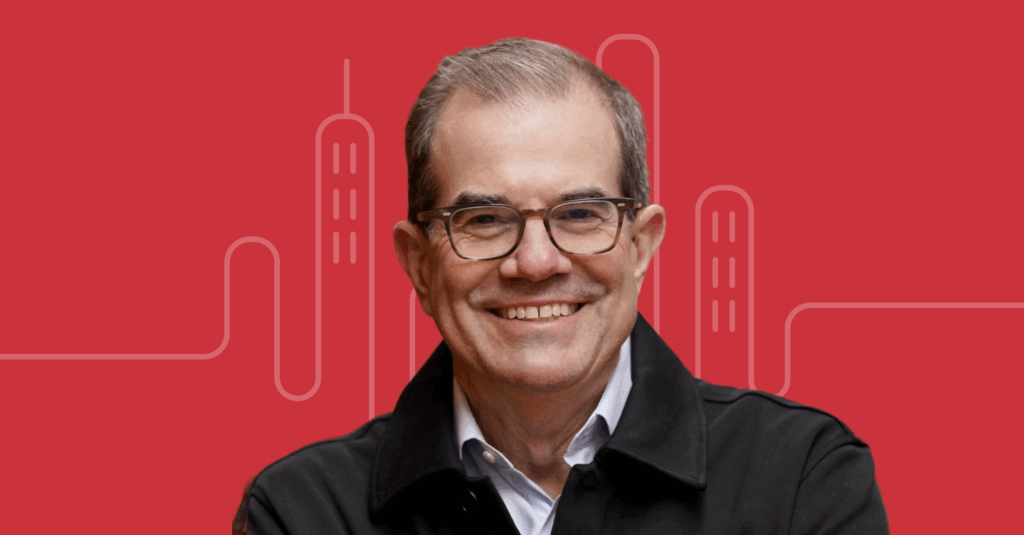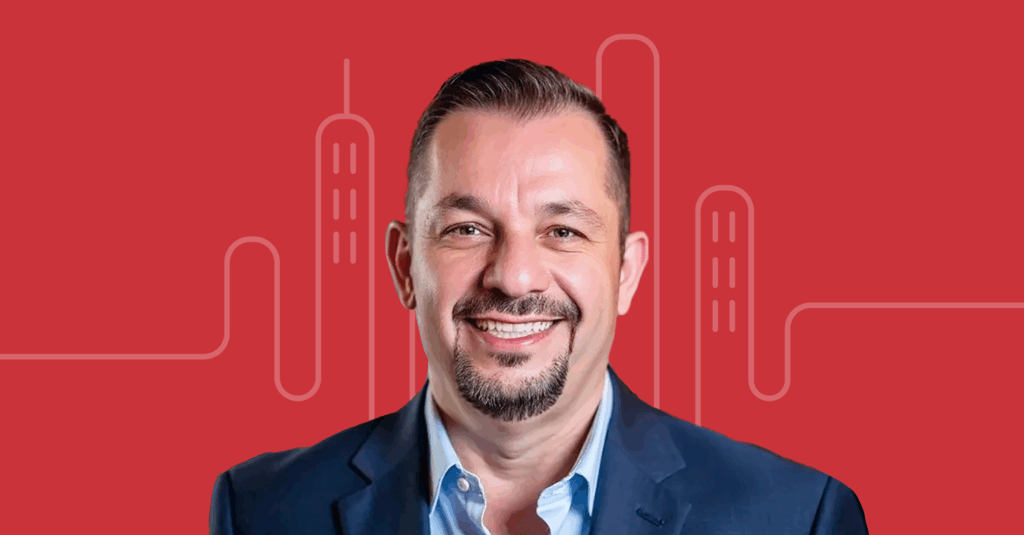A travel manager’s journey with Gilead Sciences’ Steve Sitto
Guest: Steve Sitto, Global Head of Travel, Meetings & Events at Gilead Sciences
Host: Justin Schuster, SVP of Marketing at Spotnana
Length: 26:35
Justin Schuster spoke with Steve Sitto, who discussed his strategy for modernizing Gilead Sciences’ global travel program, the power of data-driven stakeholder collaboration, and the importance of mental health in the corporate travel industry.
Justin Schuster: Welcome to The Travel Is a Human Emotion Podcast. My name is Justin Schuster and I’m the SVP of marketing at Spotnana. I’m so excited that my guest today is Steve Sitto, global head of travel meetings and events at Gilead Sciences. Steve was also named Travel Manager of the Year by BTN in 2024. Steve, I wonder if you might kick things off by just giving us a quick intro to Gilead Sciences.
Steve Sitto: Thank you for having me. So we at Gilead are a biopharmaceutical company. We specialize in research, development, and commercialization of therapies, including anything from HIV and AIDS to oncology, inflammation, liver disease. And we just, as in the news, a couple of weeks ago, we won FDA approval for a life-changing therapy for HIV and AIDS patients. So we are very thrilled with this news and looking forward to more FDA approvals in the future.
Justin Schuster: Excellent. Well, I’m very excited to dive back into the work that you’ve done at Gilead in just a minute. But before we get there, one of the big reasons I was super excited to bring you on to the podcast was because I had the pleasure of hearing you speak as the keynote presenter at the Silicon Valley / Bay Area annual education day. And during your presentation there, you talked about something that I think very few people are willing to bring to the foreground.
You talked about mental health and about work-life balance and about the challenges that travel managers face managing such a wide spectrum of responsibility. I wonder if you might recap some of the key things that you shared and what your personal journey has been with the issues.
Steve Sitto: Yeah, of course. Thank you. I was actually encouraged to speak up about this by Elizabeth West [at BTN] and I’m grateful for everybody’s support, including you guys. Justin, thank you. It’s hard to talk about mental health in the workplace because there is a stigma around it. And my goal is to really just kind of open up and let people know it’s okay to say I need help. It’s okay that I can’t finish this project. If you don’t take care of yourself, you’re not going to show up right at work. And if you can’t do that, then it takes away from your luster and your credibility as a travel buyer because you’re not fully focused.
I was fortunate enough where I left my previous role kind of damaged and I had a lot of anxiety and panic from just that type of environment. Instead of taking time ahead of the new role, I just jumped right in thinking that I can just compartmentalize and I guess sometimes ignore it too, because nobody wants to talk about it. It was a difficult journey the first year of my new role and not because of the company but because of what I came with including other stuff that was going on in my personal and work life.
I think my bosses saw it and knew it, and my amazing senior director is so supportive and understanding so he rallied leadership and of course they were all behind me.
They pushed me to take some time away and of course promised that I would have my job when I returned. So I did that and it was life-changing between therapy and everything else that I had to go through and getting my checkups. I had to almost start from scratch with my health and it worked out really well. I’m in a much, much better place. I’m a lot more mellow. And I am very grateful to them for pushing me to take care of myself because I probably wouldn’t have done it alone.
It really helps to communicate with your management. Always, it’s a positive to be transparent with your leadership. And when something is going sideways, speak up. It’s not a bad thing to say ‘I need help.’ That’s what I tell everybody who asks me about my journey. And hopefully, you know, anybody who needs help and they can reach out to me, find me on LinkedIn, however, and let me know if I can help you.
Justin Schuster: Steve, I think that’s such a wonderful and powerful message. I think it takes a tremendous amount of courage to talk about these things. And I just want to express my gratitude for that.
One of the things that I really love about Spotnana and the culture that Sarosh built here and that Steve has continued to evolve and take forward. Sarosh is really clear in saying, ‘Hey, we’re, we’re going to work really hard, but we’re going to pace for the marathon, not for a continuous sprint. And we need to make sure we’re taking time to recharge.’ We have a quarterly recharge day. We try to really find that right balance. That’s at the company level, but all of us have to figure out how to do this at the individual level as well.
That takes self-advocacy and that takes really thinking through what we each need in terms of real balance in our lives. And I just, I think it’s so powerful that you’re out there being a spokesperson and a role model for this for everyone.
Steve Sitto: Thank you. I like what Sarosh said. My CPO says often we sometimes have to move slow right now so we can move fast later. And it’s something that’s stuck with me. It’s the best advice. So the other thing is, you know, my boss told me that I need to always assume good intentions, which I do.
Sometimes you kind of spiral and go into a dark cubby hole, but for the most part, you really approach everything with a good attitude so that it doesn’t impact you emotionally. Not everything is personal. That is a practice I have to tell myself every single day. Not everything is personal. They’re not coming after you. It is what it is. And I love what my boss also says, that we have to meet the business where they are which is so smart, so simple, but so smart.
It’s something that also stuck with me. I think it’s really important to not push people into a template, not push people in a square peg, round hole kind of thing. While taking care of myself, I also have to be mindful of others in that process because I’m not a dumping ground and my colleagues and friends and family are not, and partners are not, a dumping ground.
You carry your own weight and you speak up when you have to. It’s sort of a cliche by now, but if you see something, say something. I take that pretty seriously, whether I’m walking through an airport or I’m laying in bed and my head is going 100 miles an hour as many of us experience on many nights.
Finding that balance for me was key and finding other things to do so that I’m not working at eight o’clock at night or on the weekends or on vacation. But it’s also something that they’ve coached me on where I need to really kind of stop and take care of myself. And then if I need to go back I go back afterwards, but it doesn’t have to be a marathon all day long of email and Zoom calls.
Justin Schuster: Steve, you joined Gilead Sciences about three years ago as you were saying, what was the travel program like when you joined and how have you transformed the program in the time that you’ve been there?
Steve Sitto: Good question. So, there wasn’t really anything wrong with it. It just needed to be modernized. And my predecessors did a fine job. I was asked by leadership to make significant changes. With that came an opportunity for innovation and automation. Where we could, we would use any kind of automation, whether it’s robotic process automation or AI or even now we’re looking at advanced AI solutions as well.
We implemented machine learning with BCD Travel for the telephony, which has worked out very, very well. And we globalized the program. We brought in countries that were not in it and we implemented several new configurations of our booking tool.
We redid the airline program, redid the hotel program and the ground program. So it was a huge lift. And I will say that I didn’t do it by myself. I had a colleague, Beth, who was taking over the meetings and events component, which is actually much larger than the corporate travel program and much more complex. So overall, it’s been a wildly successful couple of years, especially as we start to see the savings that are coming in and cost avoidance. And that’s good for every company’s bottom line, obviously.
Travel and the T&E policy are not static programs. They have to remain active and dynamic, and you can change them any time. And I encourage everybody to review everything, the verbiage in your T&E policy.
My recommendation is simplify, simplify, simplify. No matter what, if you have a 40 page T&E policy or a 10 page T&E policy, someone is going to always poke a hole in it. So I look at it as a 80, 20 or 90, 10 rule. If you get the majority, that’s great. So it’s worked out really well. We’ve got a robust partnership with finance now and we support one another and collaborate on everything, travel, meetings, and events.
Especially, as everybody knows, the payment space is somewhat painful so we continue to update, upgrade, and modernize as the industry is rapidly changing and more technology is coming forward. As you guys know, I’m a huge fan of Spotnana and it makes me really happy to see innovative and creative solutions that are coming forward that are scalable and they are well funded.
The money part is a risky part, especially for startups, but it doesn’t mean that every startup is bad. You just have to be cautious and make sure that you understand their investment pipeline and who’s in and who’s out. So, yeah, it’s been really good. I’m very pleased with the program.
Is it perfect? No, absolutely not. But the adoption rates are skyrocketing and out-of-policy bookings are plummeting. In a way it’s almost right-sizing itself because what I say all the time is if you want natural adoption to your program, a holistic approach to that would be that you get all the stakeholders together or have conversations separately and make sure that their voice is put into the T&E policy in the program. When you do that, adoption comes naturally because they don’t have anything else to complain about. So when you ask them and you put their input into the policy, it creates kind of an accountability. I don’t want to say visual guilt, but close to that.
It’s been, it’s been really good. I’m, I’m happy with where we are, but I know that we have so much more to do. We just wrapped up our global strategy and the technology roadmap. So we are looking at overhauling technology where we can. In some cases we have global partnerships that go way beyond travel, so we can’t touch those. But for the most part, I think as we continue to watch the industry evolve, it’s going to keep us on our toes.
I think the best thing for any buyer to do is to be out and involved either in airline advisory boards or technology or going to BTN or GBTA or wherever and look at those new suppliers and give them some time and some grace so that they feel more confident, but also you never know what you pick up from them. Sometimes you wouldn’t think about something and during the conversation it comes up and it’s all of sudden it’s a lightbulb.
Justin Schuster: When I heard you speak back in, I think this was the beginning of May, you described some really great innovation that you were driving with BCD around the call center, around routing of calls, around communications to travelers as well. Would you mind recapping some of those examples of transformation that you’ve led over at Gilead?
Steve Sitto: Sure, robotic process automation would be used for communicating customized emails to specific populations or a person and their manager. So in my previous life, we used RPA to address out of compliance expenses and within six months, all of those disappeared because they were getting a custom email that was for them that explained everything, but also it copied their manager.
So that’s one thing. Machine learning is really important because we have dedicated teams in North America and Europe. so our uptime is 17 hours for our dedicated teams. And so once the U.S. goes down a few hours later, Europe comes back up. Our reliance on emergency travel is very little because we have these teams.
Machine learning helps because the system understands who you are when calling in and also knows if you’re a booker, not a traveler. Also one of the key factors that I really, really like is that it will route you back to the agent that you spoke with. Same thing with email. So that’s a big deal because you don’t have to go back through and explain everything and you’re getting the same agent who can actually quickly help you. That’s reduced handle time.
It’s been really a blessing operationally for the program.
Justin Schuster: How many times have we all dealt with customer service for any organization, the cable company, whatever it might be, and wished we didn’t have to start from the beginning explaining what our issue is? So that’s a tremendous innovation to have put into place. What are some of the other areas of innovation that you’re really excited about going forward?
Steve Sitto: I’m such a big fan of incorporating AI into a booking stream. I think it could be fruitful, it could reduce handle times, it could reduce errors. And it just makes it a better experience because all of us have become accustomed to instant answers. You grab your phone, you go to Google or you ask the AI to look for something.
So our point of this whole thing is that we want to make sure that we can go as real time as possible with the traveler experience. Mobile app is another one where you can talk to the agent, you can look at your flights, you can change your flights. But also receive a message at arrival saying, you know, welcome to Denver, you’re staying at the Marriott, breakfast is included.
So, all of that is happening and there’s a lot more. I can’t really go into it, but there’s some good stuff coming and, and, thankfully our big executive is really supportive of automation AI and any kind of new technology that we would like to explore. He’s very open-minded, which helps a lot. The same with my boss, for example, he really gets travel, which also helps a lot.
He knows why it’s important to attend GBTA or go to a BTN thing or whatever an advisory board and that’s huge because I hear from my peers a lot about how their managers are not willing to and they don’t understand it. They think it’s a boondoggle and all that stuff. Now, like 30 years ago, it would have been in a boondoggle, no problem. But today, no.
And a lot of people will tell you, they’ll see me go into an advisory board, as soon as that is over, I’m out. And I don’t like to waste time and waste money. And I want to be home with my dog.
Justin Schuster: It sounds like it’s really helpful that you have a knowledgeable manager who appreciates the value of travel and is supportive of innovation. Still though, there are trade-offs to be made in different areas that you might invest in. How do you think about prioritizing the bets that you’re going to make on innovation?
Steve Sitto: The priority goes to enterprise-wide solutions. And if there is a potential disruption and there’s another solution that gets the priority as well. But we also are being realistic with ourselves, but also with our leaders in terms of what we want to put forward because it can get overwhelming and it can get to the point where they may think this is just all over the place.
We have to be very strategic about what we produce and what we show so that it’s easy to digest for them, but also it makes sense and they can tie it into the ecosystem. Now, funding and all that stuff is a whole different ballgame, but if you can sell the business case, you can put a good business case together and sell it, then that’s half your battle.
Justin Schuster: What are your tips for doing that? I think for a lot of people, it seems maybe a little daunting or overwhelming to try and get the support to pursue new innovation. And what advice do you have to people to help them overcome that?
Steve Sitto: Well, first you have to get your house in order, right? So that means data. Data is going to be your best friend or your worst enemy. So if you have clean data, that is a very good first step because then you can really understand the landscape and where the gaps might be. You can do a SWOT, you can do all kinds of gap analysis, whatever, and start there.
What I would do is I would just compartmentalize the pieces and separate them on a piece of paper and then just write your thoughts out. Sometimes I use Microsoft Copilot and so I can go in there and just ask it to take my notes and produce something more robust and that way I can get some of the metrics in there and there’s benchmarking it can pull that and add it to it.
It’s a tough one to sell, anything really in travel, just because a lot of people think that travel managers are just booking you a meeting room or a sleeping room and getting you a Diet Coke. Well, it’s much more complex than that.
In my previous life, I actually sat with the head of procurement. I showed him, I actually pulled up Sabre and I said, I just want you to see what it looks like on the travel agent side, but I also want you to see what it looks like in terms of how airlines do their inventory. I walked him through the buckets and how pricing works and the fare rules. He just sat back and he was like, I had no idea it was this complicated. So then I presented the data and I basically let him know that we needed headcount.
After seeing that, he actually was like, yep, no problem. I get it. And that’s why that program is doing so well, because they did get an infusion of headcount. And that is important because one person, there’s no way they can do the entire globe and understand every nuance in every country. Not a lot of people know that kind of knowledge.
Even somebody like me who’s worked and lived and traveled around the world, I still learn something every day from my colleagues around the world.
Justin Schuster: I love how amazingly rich and complicated the travel industry is. It’s one of the, on the surface, we all have, you know, booked through OTAs and it just seems like it’s a shopping experience. But once you peel that first layer and you get underneath, there’s so much richness and complexity and so much opportunity for innovation and adding value. I think that’s a really smart approach to have said, let me, let me pull back that cover for your manager and be able to say, is what’s going on behind the surface, bringing data to the table to then support the opportunities for driving real business value. That seems like two really clear steps that people can take to get the support that they need for innovation.
Steve Sitto: Yeah, yeah, I love this business and we all do. I don’t think anybody is just going to sit in this business and not like their job, or not like the industry. I think the industry itself is like one of the most social environments I’ve ever been in. And that is for me, that’s stimulating because I like I’m a social guy and I like seeing people and I love seeing our partners and I love seeing my peers and
I think it’s a good thing. I love this industry for a lot of reasons. Primarily it’s because I actually grew up with a father who was an airline pilot. And so it’s always been in my DNA somewhere. As a baby, they would put me on an airplane. I didn’t know what was going on, but as I grew up, that’s probably why I liked to fly first class because that’s all my dad did. And so, he’s the one who probably just spoiled me, FYI for anybody wondering about Steve.
Having partners like you, Justin and Sarosh and Steve and the rest of the Spotnana team, I mean, it can’t get any better than that. So yeah, I love it.
Justin Schuster: Well, it’s kind of you to say, and since this is The Travel Is a Human Emotion Podcast, the question we always ask at the end is when you reflect on the connection between travel and human emotions what stands out for you.
Steve Sitto: For me, travel is personal, for everybody, actually. Everyone cares where they sit, where they sleep, and where they eat, et cetera. So there is a lot of emotion behind the booking process, especially when it’s the direct traveler booking. There’s worry about safety. There are all kinds of
things that go through their heads and I 100% agree with our travelers who have some concerns.
The human emotion part, it could go two ways, right? So you can get really mad and upset about something that happened on your trip, or you can go the other way and write a letter because you had a really good experience.
I’ll provide feedback on both sides, but I like to write good, thorough, positive letters to the suppliers because it’s really important for them to hear it because a lot of people only take the time to complain.
Justin Schuster: Thank you so much, Steve. It’s been a pleasure spending time with you and looking forward to seeing you at GBTA and continuing to champion all the great innovation that you’re driving and bringing to the industry. We greatly appreciate it.
Steve Sitto: Thank you very much, Justin.

